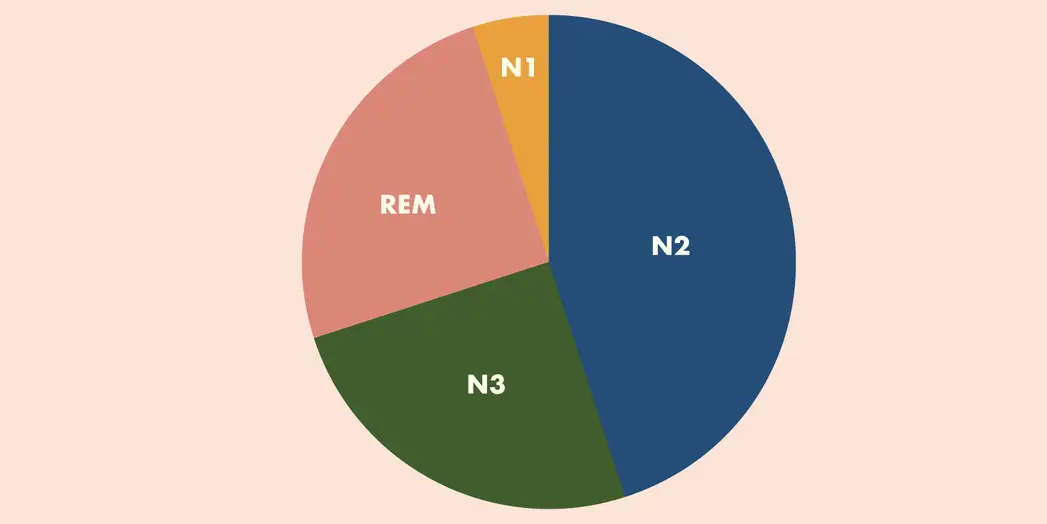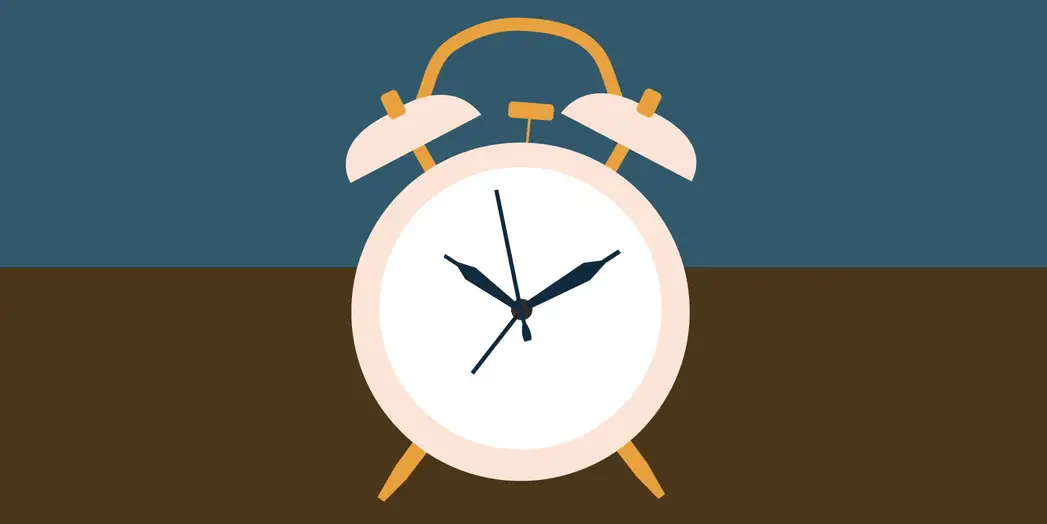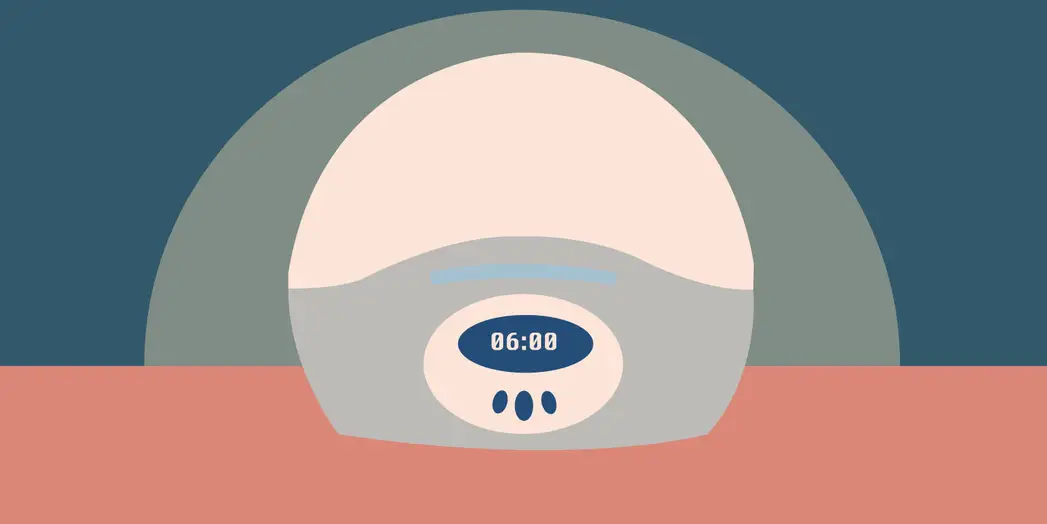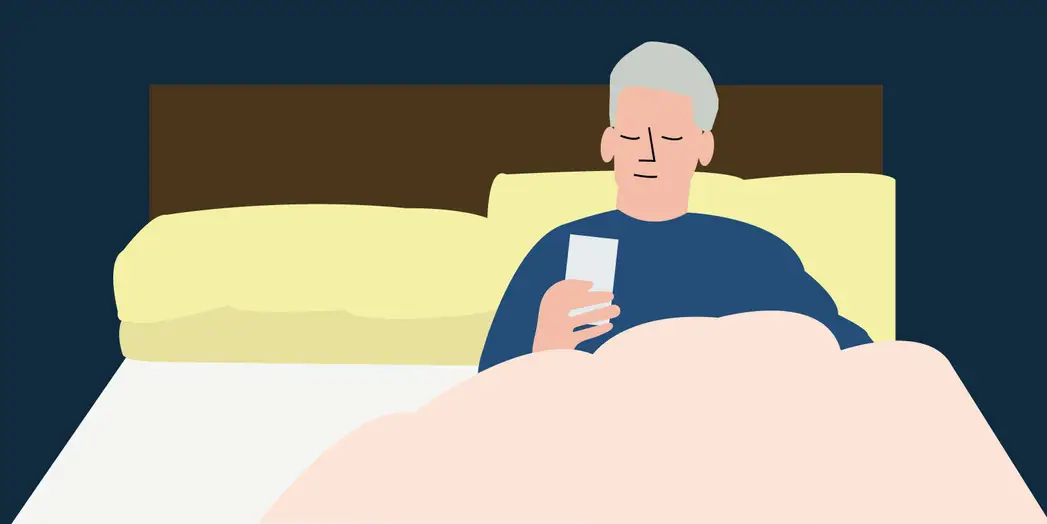Key points
Did you know that your choice of alarm clock can affect how you feel during the day? In this article, we explore just why this is and we’ll cover:
- why your alarm clock could be the reason you feel groggy first thing in the morning
- how different types of alarm noise can affect how you feel when you wake up
- alternatives to sound-based alarms that may improve how you start your day
- why it might be time to ditch your phone as an alarm clock
- how to encourage your body and mind to wake up more naturally each morning
- where to turn if you’re waking up exhausted and unrefreshed every time your alarm goes off.
More than one way to start the day
What wakes you up in the morning? Is it the first rays of sunlight gently creeping in through the window? A paw to the face from a pet that’s decided it’s definitely time you got up? Or maybe you wake up to the sweet sound of birds chirping outside.
For the vast majority of us, it’s none of the above.
Figures vary, but somewhere around 80% of us are relying on a sound-based alarm clock to rouse us from our slumbers. You might be surprised to hear that this standard wake-up method can negatively affect how you feel as you wake up and throughout the day.

Do you already hate the sound of your alarm and dread it going off each morning? Have you ever stopped to consider if there’s a better way to wake up?
In this article, we’ll look at the pros and cons of using sound to wake you up. We’ll explain why using a sound-based alarm might not be the best way to start your day and what alternatives are available to you.
To understand how sound-based alarms can impact your health and wellbeing, we need to look at how they can affect your sleep. So we’ll begin with a quick tour through the different stages of your sleep.
Your sleep changes throughout the night
Your sleep’s made up of four different phases, each with their own distinct functions and features. When you initially fall asleep, you enter the first stage of sleep, called N1. This is your lightest stage of sleep and the easiest to wake from.
This explains why sometimes as you’re dropping off to sleep, a little noise like a creak or a disturbance from outside can wake you back up. N1 usually only lasts for a few minutes. During this stage your heartbeat and breathing rate begin to slow down and your muscles start to relax.
You then pass into the next stage of sleep, called N2. While still light sleep, N2 is slightly deeper than N1. During this sleep stage, your heartbeat and breathing rate slow down a little more and your muscles become more relaxed.
Next, you enter N3, which is deep sleep. Your heartbeat and breathing rate are at their lowest and your body is fully relaxed. Because of this, you become difficult to rouse during N3.
This sleep stage is when your body carries out its housekeeping tasks: muscles are repaired, growth occurs, toxins that have built up during the day are removed and your immune system is strengthened.

Finally, you enter rapid eye movement (REM) sleep. Your breathing and heart rate increase, your eyes can be seen darting back and forth under your eyelids and your brain activity is similar to when you’re awake.
Just as deep sleep is considered important for repair and recuperation of your body, REM is thought to be important for your mind and mental wellbeing.1 2
REM sleep is when you experience most of your dreams. This sleep stage is thought to be when your brain processes emotions that have been experienced during the day and forms memories from them.
It’s not as deep as N3, but you can still be hard to wake from REM sleep. If you are woken during REM, you’ll likely be able to vividly recall whatever dream you may have been experiencing at the time.
After REM sleep, you go back into N2 and the cycle repeats again. Each full cycle takes somewhere from 90-110 minutes and you cycle through them multiple times each night.1 With each sleep cycle, you spend more time in REM sleep and less in deep sleep.
So now you know what’s going on when you sleep, what does this have to do with your alarm clock?
It’s best to wake up during light sleep
The sleep stage you wake up in can have a dramatic effect on how you feel when you wake and how you go about your day. Ideally, you want to wake up in light sleep, just after REM ends and N2 begins.
In reality, with a sound-based alarm, where in your sleep cycle you wake up is a bit of a lottery. This is what can cause problems. Sound-based alarms are very effective if you want to wake at a specific time but they can’t account for what stage of sleep you’re in when you’re woken by them.
This is why noise is the waking method of choice used in most alarm clocks: it can wake you up regardless of what stage of sleep you might be in. But, if your alarm clock rouses you during deep sleep or REM then you’ll likely wake up feeling a bit… off.
You can probably think of a time when your alarm has rudely awoken you when you weren’t quite ready. It could be that you were woken part way through an amazing dream and you were left unfulfilled, never knowing how the dream would play out.
Or maybe you woke feeling dazed and confused, needing a second or two to figure out what that awful noise was disturbing your precious sleep. Such a rude awakening is unlikely to leave you feeling ready to face the day
When you’re woken mid-cycle, you’re more likely to feel groggy, a little disorientated and will probably want to just go back to sleep. These feelings are all signs of something that’s known as sleep inertia.3
Do you dread the alarm going off each morning?
If your sleep problem is affecting the quality of your sleep, getting up whenever your alarm goes off will still be a challenge. Sleepstation can equip you with tools and techniques to improve your sleep, making sure you’re ready to seize the day, whatever time you’re set to rise.
The basics of sleep inertia
When you wake in the morning, it takes your brain and body a little time to come round, whether you’ve been woken by an alarm or not. You’re likely to feel a bit sleepy and not at your sharpest. This is sleep inertia — the transition state between sleep and wakefulness.
If you’re sleeping well, this half asleep/half awake feeling should pass in a few minutes, but it can take up to four hours for this feeling to subside if you’re sleep deprived.4
When you’re in the grips of sleep inertia, you’ll likely notice a reduction in your mental and physical performance. So you may experience:
- difficulty making decisions
- low mood or grumpiness
- feelings of disorientation and confusion
- muscle weakness.3
This is all fine if the feelings resolve fairly quickly, but when these kind of symptoms last for several hours, they can interfere with your day and make it difficult for you to be productive.
In some cases, the symptoms of sleep inertia can feel similar to if you’ve spent the previous night awake ― it’s like being sleep deprived after sleeping!
Sound-based alarm clocks can increase sleep inertia
Many things can affect how severe sleep inertia is, but the stage of sleep you’re awoken from can have a big effect. The deeper the sleep stage that’s interrupted, the worse your sleep inertia will feel.
For example, if you were to wake from N3 (deep sleep), you would have more severe sleep inertia than if you were woken from N1 (light sleep).3
Because you can’t predict what stage of sleep you’ll be in when your alarm clock sounds, you can’t know just how bad an episode of sleep inertia will be from day to day.
Not getting enough sleep can also add to the intensity of sleep inertia. Sleep deprivation is a huge problem across the globe and many people aren’t getting the amount of sleep they need each night.5
This means that a lot of people may be experiencing unpleasant levels of sleep inertia each day too. Often, sleep deprivation arises due to conflict between your daily schedule and your sleep routine because of factors like:
- going to bed late and having to wake up early
- working shifts
- being in a job that requires you to be awake for long periods.
Because of these factors, when you do try to make up your lost sleep, you’ll probably spend more of your time asleep in a deeper stage of sleep.6 This is called rebound sleep and it’s your body’s way of trying to catch up on lost sleep.
So when your alarm does sound and you wake up, you’re more likely to wake up in a deeper stage of sleep whilst also being sleep deprived, so your symptoms of sleep inertia may be more severe.
This leads to a bad start to the day on top of a worsening of existing sleep deprivation. Sleep inertia isn’t just an annoying groggy feeling, it can also be dangerous.
A good example here is drowsy driving: getting up and driving before sleep inertia has dissipated can increase the risk of car accidents.7 Studies have shown that if you’re driving before your sleep inertia has lifted, it can be harder to keep to your lane and regulate your driving speed.8
The type of sound you wake to may affect sleep inertia
Studies have looked at how different sounds affect sleep inertia upon waking. Researchers have looked at how people rate their sleep inertia after waking up to a range of noises, including:
- standard alarm tones
- gentle music (think elevator music)
- music a person personally knows and enjoys (with or without singing)
- nature sounds
- white noise or other colour noises
- melodic sounds.9 10 11
One study showed that pink noise can help reduce the intensity of sleep inertia, another found that listening to upbeat music of your choice could help and a third study found that more melodic music was best at counteracting sleep inertia than a standard alarm tone.
So if you are using a sound-based alarm, you might be able to improve your wake-up by playing around with the type of noise you’re waking to. This could help you to identify an ideal alarm sound to minimise your sleep inertia.

Waking up to a sound-based alarm clock can induce stress
Another reason why sound-based alarms aren’t ideal is because they jolt you out of your sleep. The sudden noise can activate your fight-or-flight response, making you feel stressed and anxious. This is hardly the ideal way to start your day!
As we’ve just discussed in the previous section, different types of sounds may affect how you wake up, so if you find you’re being shocked awake by your current alarm choice, it may be worth trying out different types of sound to wake you up.
If you’ve tried different sounds and you’re still not waking up well, it might be time to look beyond your sound-based alarm system.
So what’s the alternative?
Well, thankfully, there’re a few different options that may help you to wake up more gently each morning. Let’s have a look at the most popular alternatives.
The light-based alarm clock
A light-based alarm clock is a more natural alternative to a sound-based alarm clock.
Why is this?
Your body’s remarkably sensitive to light and dark. We’re hard-wired to feel wakefulness in bright environments and sleepiness in dark environments.12
Darkness falling cues the release of the hormone melatonin, which sets off a cascade of signals in the body that end with you feeling sleepy. As sunlight enters your eyes in the morning, melatonin production is suppressed and this triggers you to wake.
With this type of alarm, you set the time you want to wake up at and around 30 mins before you’re due to wake, the clock will gradually start producing light. This should gently increase your level of arousal and lead you to wake up. If you don’t wake by your set time an audible alarm goes off.
Light-based alarm clocks typically work to mimic what happens with a natural sunrise. By raising the intensity of the light they emit shortly before your chosen waking time, they give you a more gradual ‘waking up’ process.
This is considered to be more in tune with your sleep cycle and is important for a few reasons.
- The effects of sleep inertia are reduced when using a light-based alarm, partly because the light is less likely to wake you during deep sleep, meaning you feel fresher at the start of the day.13
- Studies suggest your mood on waking will be improved when using a light-based alarm clock to wake up.14
- You’re more likely to experience cognitive benefits such as improved memory and concentration when you wake up in response to light rather than sound.15
- The more natural, gradual waking process of a light-based alarm clock may reduce the likelihood of a ‘post-lunch dip’, where you feel sleepy in the afternoon.
The benefits don’t stop there either. As light exposure regulates the cycle of hormones associated with feeling sleepy and awake, it can help you establish a more regular sleeping pattern.16

The light from this type of alarm will suppress melatonin production in the morning, and this helps your body clock to reset, ready for the day ahead. You may feel less sleepy in the morning and ready to get on with your day ahead.
With your body clock synchronised to the light, you should find that you’re more alert during the lighter hours and start to get tired when darkness falls. This should help you to feel ready to sleep at a regular and predictable hour.
Given the importance of good quality sleep to overall health, it’s well worth considering replacing your sound-based alarm clock and getting a light-based solution so you can start experiencing their many benefits.17
Vibrating alarm clocks
Vibrating alarms exist in several forms, and all rely on waking you up with vibration instead of noise. They come in a range of styles, some go under your pillow or mattress, some can be integrated into your pillow. Others look like a standard alarm, but instead of making noise, they vibrate.
There’s also a huge market for wearable fitness and sleep trackers and many of these have in-built alarms that can wake you up without the need for sound. These types of devices are usually worn on the wrist like a watch and instead of making a sound, they vibrate when it’s time for you to wake.
These can also be a good option if you sleep in the same room or bed as someone else, who isn’t on the same schedule and doesn’t need to be woken by your noisy alarm clock. The downside of these alarms is that some people may sleep through the vibrations, so it won’t work for everyone.
Studies are lacking on the effect of vibrating alarms on sleep inertia and feelings on waking. While we can’t say for sure that this type of alarm will improve your wake-up, it might be something to consider if you’re looking for an alternative to a sound-based alarm clock.
Sleep stage alarm clock
These types of alarm clock work by tracking your sleep and using this data to wake you when you’re in the lightest stage of sleep. Again, these often come in the form of wearable, wrist-watch style alarms, but can involve a pad or disc that goes under your mattress as you sleep.
Sleep stage alarms track your movements, heartbeat and breathing rate while you’re sleeping and use this data to estimate when you’re in light sleep. They can use light, noise, vibration or a mix of the three to wake you up when you should be in light sleep.
You choose the time you want to be awake by and the alarm will work to wake you in a set time-frame around this point. For example, you want your alarm to go off at 7am and you set a 30 minute time-window in which the alarm can wake you before then.
The sleep stage alarm will use the data from your sleep movements, heart rate etc., to estimate when you’re in light sleep from 6.30am onwards. If it doesn’t decide you’re in light sleep in this time-frame, a regular alarm will wake you at 7am.
Whilst commercial sleep trackers can help you identify patterns in your sleep, they aren’t 100% perfect at tracking your sleep stage. So you may find you’re not woken at exactly the right point in your sleep cycle.
Why not use your mobile phone?
Advances in mobile technology have been rapid over recent years and a lot of us now rely on the alarm function of our smartphones to get us up at the right time.
Many sophisticated sleep apps exist, which claim to take into account your sleep phase and can wake you with either sound, vibration or light. While these might sound ideal, there are two main problems with using a phone app to wake you.
Firstly, the display on a smartphone simply isn’t bright enough to simulate a rising sun and generate the necessary hormonal response, so using it as a light-based alarm clock might not be very effective.
Secondly, mobile phone sleep apps need your phone to be close to you while you’re in bed. With that comes the temptation to use your device before going to sleep. This leads to poorer quality sleep because of the type of light that most mobile phone displays emit.

Encourage your body to wake up naturally
The ideal way to wake up would be naturally with no alarms, relying on the rhythms of your body clock. This isn’t always practical in our modern world, but many people still find they can wake naturally just before their alarm.
Waking up naturally helps your mind and body to come round gently and start your day off calmly. We’ve got a few tips that can help you to start waking at a more regular time and maybe reduce your reliance on an alarm.
- Keep to a sleep schedule
Going to bed and getting up at the same time each day helps to regulate your body clock. If you’re keeping to a fairly consistent bedtime each night, you should find that you wake up at roughly the same time each morning.
- Make sure you’re getting enough sleep
If your sleep need isn’t being met, then you’re not going to find it easy to wake up naturally in the morning. Have a think about how you feel when your alarm goes off. Are you rested or do you lack energy?
If you’re not getting enough sleep during the night then now could be the time to think about going to bed a little earlier at night and reassessing how you feel if you get a little more sleep.
Once you’re getting enough sleep, you may find it easier to wake up at a set time each morning. This will also help to limit sleep inertia, helping you to limit the early morning fog and grogginess when you wake.
- Overhaul your sleep hygiene
This means getting rid of things in your lifestyle that can interfere with sleep and adopting healthy sleep practices. Consider avoiding things like caffeine and alcohol in the evening and start making time to wind-down before bed.
By taking steps to improve your sleep overall, you may start to see that you wake easier in the morning and don’t rely so heavily on your alarm.
If you can’t avoid waking with an alarm, such as if you work shifts, start work before the sun’s up or follow schedules that change, then the last two tips may still be useful as they can help you to improve the quantity and quality of your sleep.
What if your sleep problem goes beyond needing a new alarm clock?
Improving how you wake up in the morning may help you feel better during the day, but it won’t fix a sleep problem. If you’re waking up unrested and unprepared for the day ahead, it could be that you have a sleep disorder.
Finding it hard to get to sleep, stay asleep, waking during the night or just feeling like you can’t sleep when you want to can all be signs of insomnia and can make it hard for you to function during the day.
Many people are living with poor sleep, unaware of the impact this can have on their daily lives. On top of this, sleep disorders too often go undiagnosed or are treated as symptoms of mental health problems such as depression.
Yet good sleep is key to your health. When your sleep isn’t at its best, both your mental and physical wellbeing can be affected.
If you think you could have a problem with your sleep, you can take our short sleep questionnaire. It’s quick and easy to complete and will show you how we could help improve your sleep.
Summary
- Sound-based alarm clocks shock you awake at the same time regardless of the stage of sleep you’re in.
- When you wake up in this way you may feel groggy for a time and not at your best.
- Light-based alarm clocks simulate the rising of the sun and can provide a gradual wake-up more in tune with your body’s natural processes.
- Vibrating alarms can offer a gentle way to wake up and can be useful when you don’t want to disturb a partner.
- We all sleep differently and your alarm preferences will be personal to you, but if you’re waking up unrefreshed, now could be the time to review what type of alarm you’re using.
- If your sleep problem goes beyond needing a new alarm clock, Sleepstation could help.
References
- Patel AK, Reddy V, Shumway KR, Araujo JF. Physiology, Sleep Stages. StatPearls Publishing, 2022. ↩︎
- Peever J, Fuller PM. Neuroscience: A distributed neural network controls REM sleep. Curr Biol 2016; 26: R34-5. ↩︎
- Hilditch CJ, McHill AW. Sleep inertia: current insights. Nat Sci Sleep 2019; 11: 155–165. ↩︎
- Tassi P, Muzet A. Sleep inertia. Sleep Med Rev 2000; 4: 341–353. ↩︎
- Wertz AT, Ronda JM, Czeisler CA, Wright KP Jr. Effects of sleep inertia on cognition. JAMA 2006; 295: 163–164. ↩︎
- Shrivastava D, Jung S, Saadat M, Sirohi R, Crewson K. How to interpret the results of a sleep study. J Community Hosp Intern Med Perspect 2014; 4: 24983. ↩︎
- Vargas-Garrido H, Moyano-Díaz E, Andrades K. Sleep problems are related to commuting accidents rather than to workplace accidents. BMC Public Health 2021; 21: 652. ↩︎
- Wörle J, Metz B, Steinborn MB, Huestegge L, Baumann M. Differential effects of driver sleepiness and sleep inertia on driving behavior. Transp Res Part F Traffic Psychol Behav 2021; 82 : 111–120. ↩︎
- McFarlane SJ, Garcia JE, Verhagen DS, Dyer AG. Alarm tones, voice warnings, and musical treatments: A systematic review of auditory countermeasures for Sleep Inertia in abrupt and casual awakenings. Clocks Sleep 2020; 2: 416–433. ↩︎
- Hall SJ, Aisbett B, Tait JL, Turner AI, Ferguson SA, Main LC. The acute physiological stress response to an emergency alarm and mobilization during the day and at night. Noise Health 2016; 18: 150–156. ↩︎
- McFarlane SJ, Garcia JE, Verhagen DS, Dyer AG. Alarm tones, music and their elements: Analysis of reported waking sounds to counteract sleep inertia. PLoS One 2020; 15: e0215788. ↩︎
- Paul KN, Saafir TB, Tosini G. The role of retinal photoreceptors in the regulation of circadian rhythms. Rev Endocr Metab Disord 2009; 10: 271–278. ↩︎
- Giménez MC, Hessels M, van de Werken M, de Vries B, Beersma DGM, Gordijn MCM. Effects of artificial dawn on subjective ratings of sleep inertia and dim light melatonin onset. Chronobiol Int 2010; 27: 1219–1241. ↩︎
- Leppämäki S, Meesters Y, Haukka J, Lönnqvist J, Partonen T. Effect of simulated dawn on quality of sleep — a community-based trial. BMC Psychiatry 2003; 3: 14. ↩︎
- Tassi P, Bonnefond A, Engasser O, Hoeft A, Eschenlauer R, Muzet A. EEG spectral power and cognitive performance during sleep inertia: the effect of normal sleep duration and partial sleep deprivation. Physiol Behav 2006; 87: 177–184. ↩︎
- Van De Werken M, Giménez MC, De Vries B, Beersma DGM, Van Someren EJW, Gordijn MCM. Effects of artificial dawn on sleep inertia, skin temperature, and the awakening cortisol response. J Sleep Res 2010; 19: 425–435. ↩︎
- Vernon L, Modecki KL, Barber BL. Mobile phones in the bedroom: Trajectories of sleep habits and subsequent adolescent psychosocial development. Child Dev 2018; 89: 66–77. ↩︎